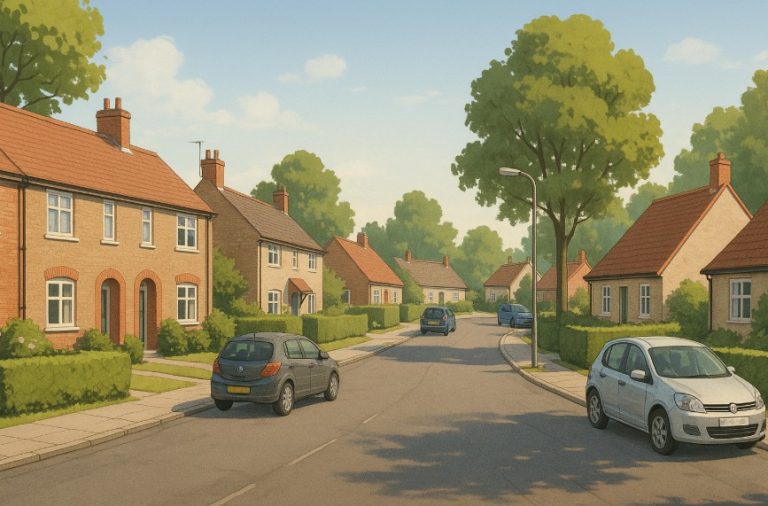In the evolving landscape of UK property investment, one term that continues to gain momentum is “turnkey property.”
For new and seasoned investors alike, this model presents an attractive proposition – a hands-off, income-generating asset delivered ready for immediate rental. But what is a turnkey property exactly, and why is it winning over so many investors?
This comprehensive guide breaks down the concept, benefits, risks, and practical considerations for those exploring turnkey property investments in the UK.
What Exactly Is A Turnkey Property?

A turnkey property is a residential or commercial property that is fully renovated and ready for immediate occupation or rental.
In the UK, these properties are often marketed towards investors who want to avoid the complexities of renovations and tenant sourcing.
Typically offered by specialist developers, turnkey properties allow buyers to generate rental income right after purchase.
These properties usually come:
- Fully furnished or equipped with necessary appliances
- Compliant with all local rental regulations
- With a tenant already in place or ready to move in
- With optional property management services
Unlike traditional property purchases that may involve months of refurbishment and preparation, turnkey properties streamline the entire investment process, making them highly attractive to remote or first-time investors.
Why Are Turnkey Properties Gaining Popularity In The UK?
The UK property market has shifted significantly over the past decade. With growing interest in passive income and reduced landlord responsibilities, turnkey properties have surged in popularity. One of the key drivers of this demand is the changing investor profile.
Many investors today:
- Prefer low-maintenance properties that generate steady returns
- Do not have the time or expertise to manage renovations
- Are based overseas and want a remote-friendly investment model
- Value predictability and professional property management
Research conducted by industry analysts shows a consistent increase in demand for properties that provide immediate rental income with minimal hassle. Cities like Manchester, Liverpool, and Birmingham have become hotspots for turnkey developments, largely due to their strong rental markets and regeneration initiatives.
How Does A Turnkey Property Work For Investors?
A turnkey investment typically follows a structured and predictable process. The entire model is designed to simplify the investor’s experience by offering an all-in-one solution.
Step-by-step overview of how a turnkey property investment works:
- Select a Property: Investors choose from a list of available turnkey properties, often in high-demand urban locations.
- Conduct Due Diligence: Legal, financial, and structural checks are carried out to ensure quality and compliance.
- Purchase the Property: Legal ownership is transferred, often with the support of the turnkey provider’s legal team.
- Tenant Placement: The property is rented out, sometimes with a tenant already secured before completion.
- Ongoing Management: A property management company takes care of rent collection, maintenance, and tenant relations.
This model is ideal for investors who want to enter the rental market without being actively involved in day-to-day operations.
What Are The Pros And Cons Of Investing In Turnkey Properties?

Investing in turnkey properties can be an effective strategy for those seeking a balance between risk, reward, and convenience. However, like any property investment, this approach carries its own set of strengths and potential drawbacks. Understanding both sides is essential for making informed decisions and aligning the investment with personal financial goals.
Advantages Of Turnkey Property Investment
Turnkey properties are particularly attractive to investors looking for minimal involvement in day-to-day operations. The benefits extend beyond convenience and into financial, strategic, and operational areas.
1. Immediate Rental Income
One of the biggest draws is that turnkey properties are usually tenanted upon purchase or can be let almost immediately. This means:
- No delay between purchase and income generation
- Instant cash flow from the start of ownership
- Predictable rental income for financial planning
2. No Renovation Required
Traditional buy-to-let investments often involve weeks or months of refurbishment before they can be marketed to tenants. Turnkey properties eliminate this stage, saving time and stress:
- No need to coordinate contractors, designers, or suppliers
- No risk of overspending on unexpected repairs
- Properties are often finished to a high, tenant-ready standard
3. Passive Investment With Property Management Included
Many turnkey providers bundle in professional property management services. This is ideal for:
- Busy professionals with limited time
- Overseas investors who cannot manage properties locally
- Individuals looking for true passive income
Management companies typically handle:
- Tenant sourcing and vetting
- Rent collection
- Maintenance and repairs
- Legal compliance and inspections
4. Lower Entry Barrier For Inexperienced Investors
For those new to property investment, a turnkey model offers a simplified and supported route into the market:
- Providers often guide buyers through legal and financial processes
- Investment decisions are based on pre-vetted properties
- Investors benefit from provider expertise and networks
5. Reduced Risk Of Cost Overruns And Delays
Since refurbishment is completed before the sale, investors are not exposed to common renovation risks such as:
- Contractor delays
- Budget overruns
- Planning permission issues
- Quality control concerns
This makes budgeting more accurate and predictable from the outset.
Disadvantages Of Turnkey Property Investment
Despite the convenience, turnkey investments are not without limitations. Certain aspects can reduce returns or expose investors to risk, particularly when due diligence is neglected.
1. Higher Purchase Prices
Turnkey properties typically carry a premium because they are fully refurbished and tenant-ready. Investors may pay more compared to buying a similar property that requires updating.
- The added convenience is priced in by the provider
- Capital growth may be slower due to the higher starting value
- Investors may find better “value” in renovation projects, if managed well
2. Less Control Over Property Choices
Since turnkey providers often control the selection and refurbishment process, investors have less influence over:
- Design choices and finishes
- Choice of location within the development
- Tenant selection and rental terms (if pre-arranged)
This can be limiting for those with specific investment criteria or design preferences.
3. Dependence On Provider Quality
The success of a turnkey investment heavily depends on the reputation and capability of the provider. Risks include:
- Overstated rental yield projections
- Sub-par renovations not visible at first glance
- Poor tenant management affecting occupancy and cash flow
- Hidden fees or unclear contractual terms
If the provider fails to deliver, the investor bears the financial consequences, often with limited recourse.
4. Limited Potential To Add Value
One common strategy in property investment is to purchase a property below market value, refurbish it, and benefit from increased equity and rental yield. Turnkey properties limit this opportunity:
- The property is already optimised for rental
- Renovation upside is already included in the purchase price
- Little scope to force capital appreciation post-purchase
This can be a disadvantage for more hands-on investors seeking value uplift strategies.
5. Variable Rental Market Conditions
Even with a tenant in place or a high rental demand area, market dynamics can change. Factors such as:
- Local economic shifts
- Changes in rental laws and regulations
- Increased competition from new developments
can affect occupancy rates and rental income. Turnkey properties are not immune to broader market volatility, and investors should still perform market research.
Are Turnkey Properties Suitable For First-Time Investors?

Turnkey investments are often ideal for first-time investors because they eliminate many of the complexities associated with traditional buy-to-let models. For individuals new to property investment, the simplified process can be a significant advantage.
Benefits for first-time buyers include:
- Pre-arranged tenancy agreements and property management
- No need to source contractors or deal with planning permission
- Professional advice throughout the purchase process
- Reduced chance of unexpected costs
Financing can be arranged similarly to other residential purchases, with most high-street lenders offering buy-to-let mortgage products for turnkey properties. However, first-time investors should still conduct thorough due diligence and consider using a solicitor experienced in property investment contracts.
What Should UK Investors Look For In A Turnkey Provider?
Choosing the right turnkey provider is one of the most critical steps in the investment process. Since the entire model is based on outsourcing essential elements such as refurbishment, letting, and management, investors must ensure they are working with reputable professionals.
Important evaluation criteria for turnkey providers:
- Proven track record with completed developments in the UK
- Transparent breakdown of refurbishment and service costs
- Independent property valuations and realistic rental estimates
- In-house or partnered property management services
- After-sales support and clear terms of service
Buyers should ask for case studies or references from previous investors and avoid providers who are reluctant to share property performance data or contracts upfront.
How Does A Turnkey Investment Compare To Buy-To-Let?
Although both models are focused on rental income, turnkey properties offer a very different experience compared to traditional buy-to-let.
Turnkey vs Traditional Buy-To-Let
| Feature | Turnkey Property | Traditional Buy-To-Let |
| Property Condition | Fully refurbished | May require renovation |
| Time Investment | Low | High |
| Control Over Management | Limited | Full control |
| Capital Growth Potential | Moderate | Varies, often higher |
| Rental Income | Immediate | Delayed (until property is let) |
| Entry Barrier | Lower for remote investors | Higher due to renovation demands |
Turnkey properties favour investors who prioritise cash flow and convenience, while buy-to-let offers more control and potential capital appreciation for those willing to invest time and effort.
What Regions In The UK Are Best For Turnkey Property Investment?

Location is one of the most critical factors in determining the success of a turnkey property investment. In the UK, not all regions offer the same levels of rental demand, affordability, or capital growth potential.
Some areas are particularly well-suited for turnkey investments due to their strong tenant markets, regeneration projects, infrastructure improvements, and competitive yields.
Turnkey investors typically seek regions that provide a balance of:
- High rental demand from professionals, students, or families
- Relatively low property prices for better yield potential
- Regeneration and economic growth indicators
- Long-term capital appreciation potential
- A supportive local rental infrastructure (letting agents, property managers, etc.)
Below are some of the top regions in the UK that consistently rank high for turnkey property investments.
Manchester
Manchester has become one of the UK’s premier property investment destinations. The city is known for its robust economy, strong population growth, and one of the largest student populations outside London. Turnkey providers have taken advantage of the demand by refurbishing city-centre apartments and suburban family homes to meet rental needs.
Key reasons investors choose Manchester:
- Average rental yields of 7% to 8.5% in key postcodes like M14, M19, and M9
- Major employers such as the BBC, Amazon, and major financial institutions
- Strong rental demand from students and young professionals
- Regeneration schemes like Victoria North, worth over £1 billion
- Excellent transport links, including the Metrolink and HS2 development plans
Manchester’s diversified economy and strong local infrastructure make it a top choice for both domestic and international turnkey investors.
Liverpool
Liverpool is a hotspot for affordable property with high rental returns. It’s particularly popular among first-time investors and those with smaller budgets looking for strong yields.
What makes Liverpool attractive:
- Entry-level property prices below £150,000 for refurbished two-bedroom homes
- Rental yields often exceeding 8% in areas like L1, L7, and L4
- A rapidly growing population of students and young professionals
- Investment in infrastructure and waterfront developments
- Cultural attractions and vibrant urban renewal boosting citywide demand
Turnkey providers frequently offer renovated terrace houses and apartments tailored to professionals and students in key areas, with property management services already in place.
Birmingham
The UK’s second-largest city by population, Birmingham continues to offer solid opportunities for turnkey property investment. Its central location, thriving job market, and numerous regeneration projects contribute to rising demand for rental accommodation.
Benefits of investing in Birmingham:
- Strong rental yields in the 6.5% to 8% range
- Long-term capital growth driven by HS2 and Big City Plan investments
- Major employers in finance, law, tech, and education
- Consistently high rental demand from professionals and students
- Lower purchase prices compared to London, but with good growth potential
Areas such as Digbeth, Edgbaston, and Perry Barr are common targets for turnkey refurbishments due to their connectivity and appeal to tenants.
Leeds
As one of the fastest-growing cities in the UK, Leeds offers both affordability and increasing demand. With a strong economy centred on finance, legal services, and technology, the city is drawing significant attention from investors.
Why Leeds is rising in popularity:
- High rental demand due to universities and graduate retention
- Growth in digital and fintech sectors increasing professional population
- Affordable purchase prices compared to the South East
- Average yields between 6.5% and 8% in areas like LS6, LS11, and LS12
- Infrastructure investment including South Bank regeneration project
Turnkey developments in Leeds often include student HMOs and newly refurbished city apartments with letting and management services bundled into the purchase.
Nottingham
Nottingham offers a mix of affordable property and high rental demand, making it ideal for turnkey investment, particularly for those entering the market with a mid-range budget.
Nottingham’s strengths include:
- Growing student population across two universities
- Average house prices below £160,000 in many investment-grade areas
- Strong demand for professional and student accommodation
- Good transport links and connectivity across the Midlands
- Yields between 7% and 9% in NG7, NG1, and NG5 postcodes
Turnkey providers often focus on Victorian terraces and low-rise flats, catering to both student and young professional tenants.
Sheffield
Although not always at the top of investor lists, Sheffield is gaining traction due to its affordability and rising demand. With a growing student base and public sector employment, the city offers sustainable rental income opportunities.
Highlights of Sheffield for turnkey investors:
- Entry-level pricing under £140,000 in many high-yield districts
- Rental demand fuelled by two large universities and NHS facilities
- Large regeneration schemes such as the Heart of the City project
- Yields of 6.5% to 8% in areas like S2, S3, and S5
Investors looking for stable long-term returns in a less saturated market are increasingly turning to Sheffield as a viable option.
Glasgow
In Scotland, Glasgow presents an attractive proposition for investors seeking both high yields and long-term value. The city has undergone massive regeneration and boasts a thriving cultural and commercial environment.
Why Glasgow appeals to turnkey investors:
- High tenant demand in areas like G1, G3, and G41
- Competitive yields above 7%
- Strong student and young professional markets
- Government-backed urban development programmes
- Affordable housing stock with high rental turnover
Glasgow also has relatively low entry costs and a supportive local government approach to urban housing, making it an emerging hub for property investors from across the UK and abroad.
How Much Does A Turnkey Property Typically Cost In The UK?

Turnkey property prices in the UK can vary considerably depending on location, size, and level of finish. On average, prices tend to be higher than standard properties due to the inclusion of refurbishment and service costs.
Example Price Comparison Table
| City | Average Turnkey Price | Average Monthly Rent | Estimated Gross Yield |
| Manchester | £170,000 | £1,200 | 8.4% |
| Liverpool | £140,000 | £1,000 | 8.6% |
| Birmingham | £180,000 | £1,150 | 7.7% |
| Nottingham | £145,000 | £950 | 7.8% |
| London (Zones 3-5) | £300,000+ | £1,500+ | ~6.0% |
In addition to the purchase price, investors should account for:
- Legal and conveyancing fees
- Stamp Duty Land Tax (SDLT)
- Potential service charges and management fees
Understanding the full cost breakdown helps investors evaluate the real return on investment and compare it to other asset classes.
What Are Common Myths About Turnkey Properties?
Despite their increasing popularity, turnkey properties are often misunderstood. Several myths persist that can mislead investors or deter them from considering this investment route.
Some of the most common misconceptions include:
- Turnkey properties are always overpriced: While some providers charge a premium, many offer fair value for the convenience and quality of the product.
- All turnkey providers guarantee rental income: Not all companies offer rental guarantees, and when they do, the terms should be scrutinised.
- Turnkey properties offer no growth potential: While growth may be more limited compared to major renovation projects, properties in high-demand areas can still appreciate in value.
Being informed about these misconceptions helps investors make decisions based on facts rather than assumptions or marketing claims.
Conclusion
Turnkey properties present a powerful opportunity for UK investors seeking a low-maintenance, income-generating asset. While not suitable for those chasing high capital growth or value-added renovations, they are ideal for individuals prioritising time, convenience, and reliable rental income.
By carefully choosing the right provider and market, investors can enjoy a streamlined entry into property investment with minimal hassle and maximum efficiency.
FAQs About Turnkey Properties in the UK
What is the difference between a turnkey and a traditional rental property?
A turnkey property is fully refurbished and ready to rent, whereas a traditional rental property may require work before it can generate income. Turnkey models are designed for passive investing, while traditional rentals offer more control and renovation opportunities.
Do turnkey properties offer guaranteed rental income?
Some providers offer rental guarantees for a fixed period, but these vary in reliability. Investors should read the fine print and understand what circumstances may void the guarantee.
How can I verify the credibility of a turnkey provider?
Check for reviews, years of experience, registered company details, past project portfolios, and seek independent legal advice before entering into contracts.
Is it better to buy a turnkey property with cash or mortgage?
Both options are viable. Cash purchases offer faster transactions and sometimes discounts, while mortgages provide leverage. The decision depends on the investor’s strategy and available capital.
Can I visit the property before buying a turnkey investment?
Yes, most reputable providers will offer property tours or virtual viewings. It’s always advisable to view the property in some form before committing financially.
What taxes apply to turnkey property investments in the UK?
Buyers may be subject to Stamp Duty Land Tax (SDLT), income tax on rental earnings, and capital gains tax upon sale. Tax liabilities should be reviewed with a professional.
How do turnkey investments perform during economic downturns?
Turnkey properties often maintain value better due to tenant-ready condition and ongoing demand in high-rental areas. However, yields may fluctuate, and investors should diversify and plan accordingly.






